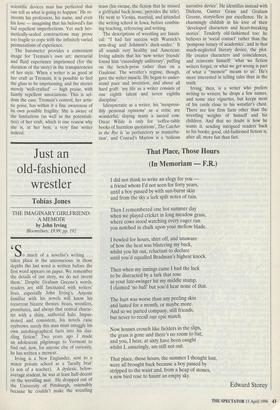Just an old-fashioned wrestler
Tobias Jones
THE IMAGINARY GIRLFRIEND: A MEMOIR by John Irving Bloomsbury, £9.99, pp. 192 o much of a novelist's writing . . . takes place in the unconscious: in those depths the last word is written before the first word appears on paper. We remember the details of our story, we do not invent them.' Despite Graham Greene's words, readers are still fascinated with writers' lives, especially John Irving's. Anyone familiar with his novels will know his recurrent bizarre themes: bears, wrestlers, prostitutes, and always that central charac- ter with a shiny, authorial halo. Impas- sioned and consistent, his novels raise eyebrows: surely this man must smuggle his own autobiographical facts into his daz- zling fiction? Two years ago I made an adolescent pilgrimage to Vermont to find out; now, for anyone else of curiosity, he has written a memoir.
Irving is a New Englander, sent to a minor private school as a 'faculty brat' (a son of a teacher). A dyslexic, below- average student, he was at least half-decent on the wrestling mat. He dropped out of the University of Pittsburgh, ostensibly because he couldn't make the wrestling
`S
team (his excuse, the fiction that he missed a girlfriend back home, provides the title). He went to Vienna, married, and attended the writing school in Iowa, before combin- ing teaching, refereeing and writing.
The descriptions of wrestling are fanati- cal: "I had fair success with Warnick's arm-drag and Johnson's duck-under.' It all sounds .very healthy and American: Irving admits that his 'new writer friends' found him 'exceedingly unliterary', puffing on the bench-press rather than on a Gauloise. The wrestler's regime, though, gave the writer muscle. He began to under- stand pace and invention, and above all hard graft: 'my life as a writer consists of one eighth talent and seven eighths discipline'.
Idiosyncratic as a writer, his 'inexpress- ibly personal opinions' as a critic are wonderful, slaying many a sacred cow. Oscar Wilde is only for 'coffee-table books of harmless quotations', The Catcher in the Rye is 'as perfunctory as masturba- tion', and Conrad's Marlow is a 'tedious narrative device'. He identifies instead with Dickens, Gunter Grass and Graham Greene, storytellers par excellence. He is charmingly childish in his love of their `developed characters and heart-breaking stories'. Tenderly old-fashioned too: he believes in 'social contact' rather than the `pompous lunacy of academics', and in that much-neglected literary device, the plot. He creates characters and coincidences, and reinvents himself: 'what we fiction writers forget, or what we get wrong is part of what a "memoir" means to us'. He's more interested in telling tales than in the truth.
Irving, then, is a writer who prefers writing to writers; he drops a few names, and some nice vignettes, but keeps most of his cards close to his wrestler's chest. There are few firm facts other than the wrestling weights of himself and his children. And that no doubt is how he wants it, sending intrigued readers back to his books; good, old-fashioned fiction is, after all, more fun than fact.


































































 Previous page
Previous page